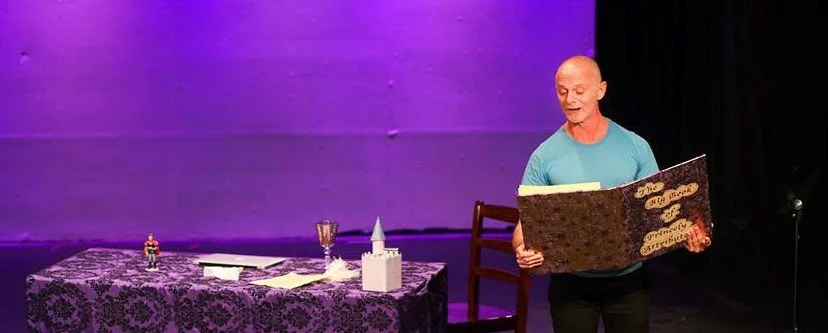Billy Hipkins is the star of a show about obsession and the theater, Prince Charming, You’re Late. Photograph by Richard Koek. Banner photo by Dave Mack.
The title of Billy Hipkins’s solo show promises lighthearted fun, and the actor often has a twinkle in his eye as he performs it. However, in spite of the elfin charm of Hipkins himself—a sixtysomething gay man who has worked in theater as a dresser and occasionally an actor—Prince Charming, You’re Late strikes many of the darker notes of a fairy tale by the Grimm brothers.
The piece takes the form of a confessional, starting with the actor’s realization at a young age that he didn’t want to be like the people around him, and that there was something about him that made him exceptional. Amid the dreariness of his existence, he hoped that a Prince Charming would arrive: “I’d beg him to save me from my ordinary life,” says Hipkins. His white knight would be “pure of body, pure of heart,” he says optimistically.
“Certain elements of nostalgia that Hipkins incorporates satirically pay off well. ”
The childhood fantasy comes chockablock with fairy-tale references and dictionary consultations that dry up the excitement. Hipkins first appears holding a big book; anyone who has seen Fractured Fairy Tales from the 1960s Saturday morning show The Adventures of Rocky and Bullwinkle and Friends will recognize the large format and golden touches on the cover. Hipkins also makes use (excessively) of a dictionary, pulling it out to recite definitions of charm, charming, Prince Charming (who has his own entry), innocent and crush. As he reads aloud, Hipkins employs a voice of earnest authority more akin to Peter Falk in The Princess Bride than to the inherently comic quavers of Edward Everett Horton, who narrated Fractured Fairy Tales.
The early consultations of books are just a jumping-off point for Hipkins to reexamine his childhood struggles with his sexuality, and the conceit of the fairy tale outwears its welcome quickly. By the time he tells the audience, “Oh, the lovely little boy was me,” it has long been apparent.
However, certain elements of nostalgia that Hipkins incorporates satirically pay off well. He introduces a period party game called Mystery Date and a 1963 song by 15-year-old Peggy March called “I Wish I Were a Princess”—from “a time before the empowered princess movement,” he wryly advises the audience. In Mystery Date, he notes, would-be princesses ran the risk of choosing a door behind which was a “grease monkey.” Although the grease monkey was the dud boyfriend, notes Hipkins, “the dud is hot.”
Eventually, with his sexuality settled, he takes up the main thread of his story: Hipkins once had a crush on a handsome straight actor, assigned the pseudonym “Jeff,” for whom he served as dresser in a Broadway musical. The admiration starts out innocently, but it turns darker as Hipkins becomes more obsessive about his nonsexual affection. Or, as he says, “I got this big old crush on Jeff. He’s half my age and confirmed straight.” As the professional relationship continues, the lines between Hipkins’s devotion to Jeff and his stalking and surfing the Internet to learn about his crush become blurred.
Hipkins reflects on his obsession with a straight performer. Photograph by Richard Koek.
To give him credit, Hipkins’s subject matter—gay men with crushes on straight ones—is unusual, yet even though most people will have experienced unrequited love, the production doesn’t ever seem to encompass a universal message. And the fairy-tale allusions feel relentless: there are mentions of dragons, an ogre, and a fairy godmother still to come.
In spite of three scenic credits (Jerome Joseph Gentes, Mark Finley, and Michael David Bourque), the stage for Perry Dell’Aquila’s production is sparsely set and includes a tall, thin bookcase; an ironing board (to keep Prince Charming’s costumes pressed); a mannequin; and a pine toy box. The most visually arresting moment comes when Hipkins puts on a princess gown, then a second one.
A couple of times Hipkins relies on the hoary theatrical trope of breaking character to ask the tech people for more light or a sound cue. He orders “flute music” and gets “Greensleeves.” Such familiar theatrical tricks keep the piece earthbound. Indeed, the spontaneity of a moment when Hipkins opens up about his own white knight—“He don’t gotta be white. Trust!” he says with fervor and a shake of his head—throws the contrivances of the rest into relief.
Eventually the Broadway musical closes, and Hipkins suffers the fate of unrequited lovers. He does a good deal of self-examination, and he owns his behavior, acknowledging that “Jeff is not my boyfriend,” and musing, “I bit into an apple that was poison.” The piece, although fitfully enjoyable and engaging, can’t escape giving the impression that it’s ultimately a form of therapy for its star.
The TigerBear production of Prince Charming, You’re Late plays through July 23 at Theatre Row’s Theatre Two (410 W. 42nd St.). Evening performances are at 7 p.m. Wednesday, Thursday, Saturday and Sunday, and at 8 p.m. on Friday. Matinees are at 2 p.m. Saturdays. For tickets and information, visit bfany.org/theatre-row.




